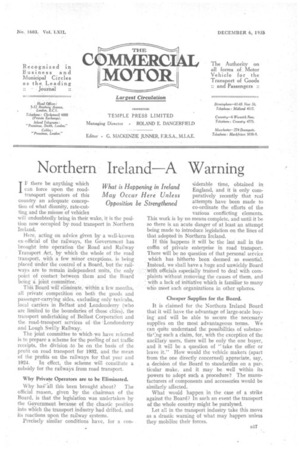Northern IrelandA Warning F there be anything which can force
Page 31

If you've noticed an error in this article please click here to report it so we can fix it.
upon the road transport operators of this country an adequate conception of what disunity, rate-cutting and the misuse of vehicles will undoubtedly bring in their wake, it is the position now occupied by-road transport in Northern Ireland.
Here, acting On advice given by a well-known ex-official of the railways, the Government has brought into operation the Road and Railway Transport Act, by which the whole of the road transport, with a few minor exceptions, is being placed under the control of a Board, but the railways are to remain independent .units, the only point of contact between them and the Board being a. joint committee: • This Board will eliminate, within a few months, all private competition on both the goods and passenger-carrying sides, excluding only taxicabs, local carriers in Belfast and Londonderry (who are limited to the boundaries of those cities), the transport undertaking of Belfast Corporation and the road-transport services of the t Londonderry and Lough Swilly Railway.
The joint committee to which-we have referred is to prepare a scheme for the pooling of net traffic receipts, the division ..to be on the basis of the profit on road transport for 1932, and the mean of the profits on the railways for that year and 1924. In effect, the scheme will constitute a subsidy for the railways from road transport.
Why Private Operators are to be Eliminated.
Why hall this been brought about? The official reason, given by the chairman of the Board, is that the legislation was undertaken by the Government becauseof the chaotic position into which the transport industry had drifted, and its reactions upon the railway systems.
Precisely similar conditions have, for a con siderable time, obtained in England, and it is only comparatively recently that real attempts have been made to co-ordinate the efforts of the various conflicting elements. This work is by no means complete, and until it be so there is an acute danger of at least an attempt being made to introduce legislation on the lines of that adopted in NorthernIreland.
If this happens it will be the last nail in the coffin of private enterprise in road transport. There will be no question of that personal service which has hitherto been deemed so essential, Instead, we shall have a huge and unwieldy Board with officials especially trained to deal with complaints without removing the causes of them, and with a lack of initiative which is familiar to many who meet such organizations in other spheres.
Cheaper Supplies for the Board.
It is claimed for the Northern Ireland Board that it will have the advantage of large-scale buying and will be able to secure the necessary supplies on the most advantageous terms. We can quite understand the possibilities of substantia4:ng such a claim, for, with the exception of the ancillary users, there will be only the one buyer, and it will be a question of "take the offer or leave it." How would the vehicle makers (apart from the one directly concerned) appreciate, say, a decision of the• Board to standardize on a par , ticular make, and it may be well within its powers to adopt such a procedure? The manufacturers of components and accessories would be similarly affected. What would happen in the case of a strike against the Board? In such an event the transport of the whole country might be paralysed.
Let all in the transport industry take this move as a drastic warning of what may happen unless they mobilize their forces.




























































































